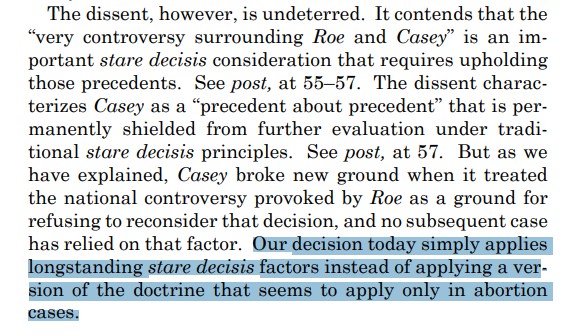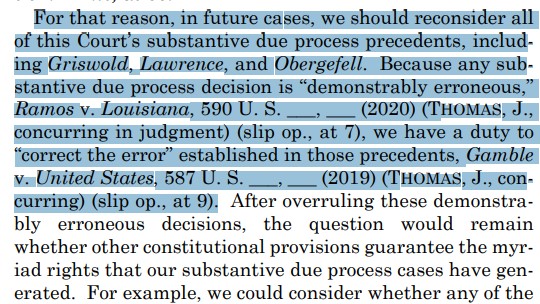
The US Supreme Court decides there is no constitutionally protected right to a legal abortion: supremecourt.gov/opinions/21pdf…
6-3 decision-Breyer/Sotomayor/Kagan dissent: "With sorrow—for this Court, but more, for the many millions of American women who have today lost a fundamental constitutional protection—we dissent."
The quick takeaway is that *any* state may not criminalize and ban all abortions. There are no longer any requirements for any exceptions for health, death, rape, or incest. Some "trigger" laws will make that happen nearly right away.
The decision is a landmark-of the worst kind. Constitutional rights recognized and relied upon can now be eliminated.
Be careful-this paragraph is going to be quoted in the press as *see, it's only about abortion and nothing else* but-- 

WHY? Because Thomas's concurrence makes it plain-the Court can *also* go after the decisions on same sex marriage, birth control, and the right to sexual intimacy 

The IRONY of Kavanaugh claiming modesty as the conservative supermajority dismantles Roe just because (and after the Bruen Second Amendment decision striking down NY's law) 

The dissent's summary: "Roe held, and Casey reaffirmed, that . . . the government could not make that choice for women. The government could not control a woman’s body or the course of a woman’s life: IT COULD NOT DETERMINE WHAT THE WOMAN'S FUTURE WOULD BE."
And that's the way to understand it: *The Supreme Court's decision in Dobbs means that if your body can be pregnant, you now have lost control over what your future can be.*
And while Kavanaugh is *pretty sure* these aren't hard questions, the reality is that these issues are going to be litigated-and people are going to be punished as a result 

Dobbs isn't just people people who are seeking abortions in jeopardy. The American criminal justice system, with its perverse incentives, will cast its net wide--think women who have miscarriages, women who *contemplate* abortion, and *every* person who might help them.
We are very likely going to look back on this moment as not just about abortion rights--which itself is momentous-but a turning point. No right protecting vulnerable groups can be taken for granted. Stare decisis isn't enough to grant that stability.
Anyway, I am terrible at tweet threads, but I hope this helped you get the gist of why Dobbs is an earthquake.
• • •
Missing some Tweet in this thread? You can try to
force a refresh






